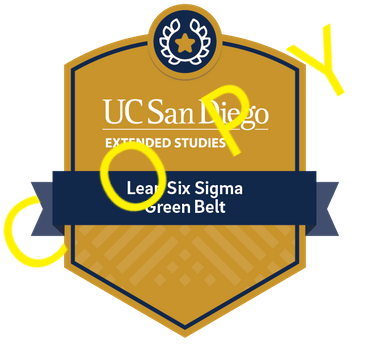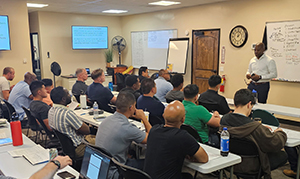Lean Six Sigma Green and Black Belt
Powerful Tools. Hands-On Experience. Expert Mentoring.
About the Lean Six Sigma Green and Black Belt Program
Earn your Lean Six Sigma Green & Black Belt Certificate. Advance your career with skills to drive efficiency and achieve measurable results.
Any Process. Any Industry.
Lean Six Sigma (LSS) is a comprehensive framework of tools, techniques, and principles designed to improve quality and processes, leading to enhanced performance and reduced costs. Applicable in any industry, LSS can streamline any process. This program provides students with the coaching and education needed to effectively utilize LSS tools, understand process requirements, identify constraints, and establish flow and stability.
This training is ideal for participants who wish to advance their careers, and:
- Improve Quality and Delivery
- Enhance Competitiveness and Reduce Costs
- Boost Customer and Employee Satisfaction
An Intro to Lean Six Sigma: What's With The Belts?
Watch a Free Info Session Anytime! Discover the meaning behind Lean Six Sigma with UC San Diego Master Black Belts Tracy O'Rourke and Jim Athon as they demystify the belt system and explain how this process improvement methodology can drive meaningful change in your organization.
An Intro to Lean Six Sigma: What's With The Belts?
Watch a Free Info Session Anytime! Discover the meaning behind Lean Six Sigma with UC San Diego Master Black Belts Tracy O'Rourke and Jim Athon as they demystify the belt system and explain how this process improvement methodology can drive meaningful change in your organization.
Two Pathways. One Program.
Students who want to earn a Lean Six Sigma Green and Black Belt Certificate can select between two pathways.
- Pathway 1 — Complete the Lean Six Sigma Green and Black Belt together in one course.
- Duration: 5 months
- Tuition: $5,695
- Pathway 2 — Complete the Lean Six Sigma Green Belt and Lean Six Sigma Black Belt seperately in two courses.
- Duration: 8 months if completing in consecutive quarters
- Tuition: $6,390
Optional but Valuable: Build a Strong Foundation with Lean Six Sigma Yellow Belt
Enrollment Options
| LSS Green & Black Belt *Pathway 1 | LSS Green & Black Belt *Pathway 2 | LSS Yellow Belt | Root Cause Analysis Workshop | Group/Custom Training | |
| Required to Earn Certificate | Yes | Yes | No - Optional but Valuable | No | N/A |
| Cost | $5,695 | $6,390 | $495 | $590 | Custom |
| Duration | 5 months | 8 months to 5 years | 3 Evenings | 1 Day | Flexible |
| Includes | Green & Black Belt together in one course | Green & Black Belt separately in two courses | Foundational | All required courses + Lean Six Sigma Green Belt certificate | Dedicated support team; guided turnkey exectution |
| Discount & Benefits | Save $695 | Flexible schedule - register individually | Earn $75 towards Green/Black Belt | Alumni receive $50 off | Tailored curriculum & schedule for 12+ people |
| Enroll | Enroll | Enroll | Enroll | Enroll | Enroll |
| Contact | ProcessPrograms@ucsd.edu | ||||
Questions?
We’re here to help! Our team is dedicated to ensuring you have all the information you need to make an informed decision about your education.
Contact Your Program Manager, Angela Miller
📅 Schedule a Phone Appointment or email: ProcessPrograms@ucsd.edu

What You'll Gain
The process improvement skillset helps all business professionals to be more effective and efficient. The Lean Six Sigma training programs specifically prepare students for the following careers:
- Process, Quality, Industrial, and Manufacturing Engineer
- Continuous Improvement Specialist/Manager/Director
- Operational Excellence and Business Process Professional
- Quality Assurance and Process Improvement Professional
Program Benefits:
- Project-Based Learning: Apply techniques to a real business project and receive direct coaching from experienced instructors.
- In-Depth Curriculum: Emphasizes LSS tools and and management skills.
- Flexible Learning Options: Live Online (via Zoom), Online Asychronous, or In-Person.
- Expert Instructors: Designed and delivered by industry experts with decades of process improvement experience.
- Connect with our Lean Six Sigma Alumni in networking events and LinkedIn group. Receive access to dedicated Career Resources Hub with career information, job postings, events and tutorials.
- Verify: Starting in 2023, graduates receive a verifiable digitial credential, which can be shared on social media and with colleagues and employers to recognize your achievement

Learn More
- Program curriculum is aligned with the American Society for Quality's (ASQ's) Body of Knowledge, providing the education needed to prepare for CSSB certification.
- Training covers areas of competency in portions of ASQ's Manager of Quality (CMQ), Certified Engeineer (CQE), and Quality Auditor (CQA).
- Project Managers can maintain their PMP certification and earn PDU's through the Project Management Institute.
No-Interest Payment Plan
UC San Diego Extended Studies offers a no-interest payment plan, allowing you to divide the tuition into manageable monthly portions.
The first payment is required to process your registration and recurring payments are due on the 15th of each month.
Before submitting, please visit the program page to select the section.
request a payment plan
Project Management Package Options
Lean Six Sigma courses fulfill the elective units needed to earn the Project Management Certificate. If you'd like to complete both programs together in a more condensed format consider a Package option, which provide set schedules and a reduction in tuition. We offer two package options:
- Project Management with Lean Six Sigma Green Belt
- Project Management with Lean Six Sigma Green and Black Belt
What Students Are Saying:
According to a recent Alumni Survey, 95% of graduates reported that UC San Diego's Lean Six Sigma training significantly improved their work performance and team efficiency.
Graduates noted that they feel empowered to drive positive change, boost productivity, and enhance their marketability. They also value the networking opportunities with peers and industry leaders, which have helped propel their careers forward.
Lean Six Sigma Green and Black Belt
Information Session
Find out more about the program and meet the instructors in a free, online information session.
Required
Pathway 1 - Complete the Green and Black Belt together in one course.
Required
Pathway 2 - Complete the Green Belt and Black Belt separately in two courses.
Courses of Interest
Does not count towards the certificate
Funding Options & International Opportunities
No-Interest Payment Plan
All students are eligible to apply for a no-interest payment plan, to divide the tuition into more manageable monthly payments. The first payment is needed to process your registration, and recurring payments will be due on the 15th of each month. To request a plan click here: No-Interest Payment Plan Request Form.
International Programs
International students have the opportunity to enhance their studies by participating in the Lean Six Sigma training.This pathway may allow you to apply for Optional Practical Training (OPT), giving you the chance to gain hands-on experience with a U.S. company.
For more information on applying, please visit the International Programs website or contact ipinfo@ucsd.edu. If you have any questions about visa requirements or eligibility, the International Programs team is here to assist you.
Veterans Education Benefits
The Lean Six Sigma Green & Black Belt Certificate programs are approved for Veterans' funding. Eligible students may apply any of the following VA Education Benefits through UC San Diego Extended Studies. For assistance with applying your benefits to this program, please visit the Veteran Benefits office or contact us at unex-veterans@ucsd.edu.
UC San Diego Staff
Are you a UC San Diego staff member? We are proud to collaborate with the University to offer exclusive professional development opportunities designed to support your growth and success.
Lean Six Sigma Green Belt Scholarship
Hosted annually in partnership with the Operational Strategic Initiatives team, this scholarship provides UC San Diego staff the opportunity to enhance their process improvement skills.
Learn more and apply here.Lean Healthcare Training for UC San Diego Health Staff
UC San Diego Health System staff may be eligible for specialized Lean Healthcare courses through the Transformational Healthcare Team. These courses are designed to equip healthcare professionals with essential process improvement tools.
Explore training opportunities here.
Workforce Innovation & Opportunity Act
UC San Diego Extended Studies is proud to be an approved training provider for the Workforce Innovation and Opportunity Act (WIOA). If you're a displaced or disadvantaged worker, you may qualify for federal assistance to help fund your education. To explore available funding and determine your eligibility, please reach out to one of the following:
- San Diego Workforce Partnership - workforce.org/career-centers
- EDD - www.edd.ca.gov
Once you're approved, we're here to help finalize your paperwork—just email unex-workforce@ucsd.edu, and we’ll guide you through the next steps.

Visit The Virtual Career Hub Today To Unlock Your Benefits!
FAQs
In Pathway 2, students complete the Lean Six Sigma Green Belt and Lean Six Sigma Black Belt separately in two courses.
When registering, students may choose between a Letter Grade or Pass/No Pass option. As long as a student receives a passing score (70% or higher), they will earn the same certificate of completion and any related documents, regardless of the grading method selected.
If you're pursuing employer reimbursement, we recommend checking with your company to confirm whether a Letter Grade is required for reimbursement eligibility.
Students can update their grading option via their MyExtension student portal anytime before 12:00 a.m. on the final class meeting.
Students can also view their final grades and download an official transcript through their MyExtension student portal.
Those who complete both the Green and Black Belt programs will receive a specialized certificate, mailed directly to them.
- Focus on "customer": Identify your customers, whether that is clients, vendors, patrons, other departments, etc. Once you have your customers identified, gather their input on their goals and pain points. As your project moves forward, involve your customers in the discussions, along with your Subject Matter Experts.
- Don't jump to improve: Strive to address a root cause. Leverage data to validate ideas, and pilot changes to check for downstream considerations. This will drive you towards averting fires, rather than frantically extinguishing them.
- Empower staff at all levels: Process knowledge and ideas should be generated from the staff who perform the work. The Lean Practitioner facilitates discussions and manages the project, but the teams provide and implement solutions. Not only does this secure creative and effective ideas, but it also facilitates change management and longevity of your outcomes.
- Explore assumptions and ask ‘Why’: Dig deeper to clear obstacles we have created for ourselves over time. For example, if you hear "There's a policy which drives that step," then consider whether the policy has changed, or whether other comparable departments have interpreted and implemented the policy differently. If you hear "We've always done it that way" then prompt your team to consider whether it has to be done that way.
- Lean Six Sigma Yellow Belt (Foundational - 10 hours)
- Lean Six Sigma Green Belt (Intermediate - 40 hours)
- Lean Six Sigma Green & Black Belt Combo (Advanced - 90 hours)
- Already have a Green Belt? Check out the Lean Six Sigma Black Belt (Advanced - 55 hours)
UC San Diego also embraces a Lean Six Sigma culture. To date, over 6,000 staff members have pursued process improvement training. This has empowered and enabled us to identify, assess, and solve issues with a customer-centric balance of efficiency and effectiveness. We invite you to join the community, and apply process improvement at your organization!
Click here to watch a short video: UCSD’s Lean Journey.
Yes. UC San Diego is accredited by the Western Association of Schools and Colleges (WASC). The Division of Extended Studies, like all other schools, colleges, and departments at UC San Diego, is accredited through the University.
All courses and certificate programs offered by UC San Diego Division of Extended Studies are developed and administered in accordance with University of California Extension policy and the regulations of the UC Academic Senate.
- A trusted name in Lean Six Sigma, with robust certificate programs for 25+ years.
- World Class Instructors: Trainings are conducted by a team of skilled LSS Master Black Belts and Lean experts, including Tracy O’Rourke, Jim Athon, Sabine Rentschar, Brion Hurley, Luis Socconini, Phaniendra Somraj, Pete Thurman, Elisabeth Swan, and Mike Osterling.
- Small Classrooms: Classes are limited to 16 - 22 students, to allow for ample coaching and project mentorship. As such, space is limited and registering early is recommended.
- Project Application: We exemplify the model of Learn By Doing. To earn a Green and Black Belt, all students must improve a real business process as part of the training.
- Project Coaching and Mentorship: Students have the opportunity to apply the Lean Six Sigma tools and concepts under the guidance of an experienced Master Black Belt. All trainings are comprehensivec, collaborative, and instructor led.
- Earn a verifiable digital credential, which can be shared on social media, and with colleagues and employers to recognize your achievement.
- Trusted by some of San Diego’s leading organizations, including Dexcom, SHARP, Costco, Illumina, UCSD Health, to name a few. We also focus on training fellow educational institutions, including a variety of University of California campus’ and University’s across the country.
Pathway 1 (Condensed): Complete the Lean Six Sigma Green and Black Belt together in one course.
- Duration: 5 months
- Tuition: $5,595
- Format: Live Online (Instructor led classes hosted via Zoom)
Pathway 2: Complete the Lean Six Sigma Green Belt and Lean Six Sigma Black Belt separately in two courses.
- Duration: Minimum of 8 months if completing in consecutive quarters
- Tuition: $6,290
- Format: Live Online or Asychonous Online; Green Belt is hosted In-Person.
- Staff and faculty discounts
- Programs for the unemployed or underemployed
- Private student loans
- And more…
If you are a veteran who served in our armed forces, you may be eligible to use your veteran education benefits to cover some or all of your program tuition. Please review our Veterans Education Benefits page for details. You are also welcome to reach out to the Extended Studies Veteran’s team by contacting unex-veterans@ucsd.edu.
Additional Discount or Scholarship Opportunities:
- San Diego Project Management Institute (PMI-SD) chapter members may be eligible to receive discounts on LSS courses. Click here for details.
- UCSD Lean Six Sigma Staff Scholarship - Visit OSI.UCSD.EDU for details.
- UCSD Health staff may be eligible to pursue Lean Healthcare Training, which is provided at no cost.
- Join the Business Excellence Community
Connect with UC San Diego faculty and staff who are committed to continuous improvement. Explore a variety of free events—including webinars, conferences, and networking sessions—designed to help you sharpen your skills, share best practices, and expand your network. Learn More. - Attend Process Palooza
Be part of UC San Diego’s annual celebration of continuous improvement! Process Palooza is a high-energy, interactive event where you can engage with others at every stage of their Lean Six Sigma journey—whether you're just starting or looking to grow your impact. https://processpalooza.ucsd.edu/ - Join the LSS Alumni Mixer
Lean Six Sigma graduates are invited to an annual in-person alumni mixer—a great way to reconnect, share experiences, and continue learning. To receive updates about the next event, contact processprograms@ucsd.edu. - Connect on LinkedIn
Join our Lean Six Sigma Alumni LinkedIn group, home to a growing network of over 600 professionals. Stay in touch with fellow grads, hear about job opportunities, and share your continuous improvement wins.
Note that the Black Belt level project is much larger in scope, and students must achieve a cost savings of $100k, projected annually.
- Measurable: Either the data needed for the project already exists or may be readily gathered. That is, there is a clearly identifiable unit, and you can quantify what makes that unit defective
- Existing Process: DMAIC assumes an existing process that has one or more deficiencies or inefficiencies that need to be addressed. It is not optimal for new process development.
- Incremental Improvement: DMAIC is designed to diagnose and address only one (or a few) issues at one time and is not intended for wholesale re-design of a process.
- Financial Results: You can clearly demonstrate the financial (or other genuine business) benefits of improving the process.
- Unknown Root Cause: If you are sure you know what is causing the variation in your process, fix it! DMAIC assumes we don’t know exactly where the process is broken, or why.
- Unknown Solution: If we know what to do to fix the problem, and it is cost-beneficial, fix it! DMAIC assumes we don’t yet know how to fix it, especially since we don’t know where it is broken!
The more advanced Black Belt project accounts for 53% over the final grade. The Black Belt Project must show projected cost savings of at least $100,000 annualized hard savings. The final project presentation must Show use of Tools, Actions taken to modify a process, quantifiable Results, and Controls to assure process sustains improvement. The presentation must include the application of Lean Six Sigma tools and concepts, and include the following:
- Project Charter
- SIPOC
- Process Map (basic, swim lane, VSM, etc. as appropriate)
- 5 Why’s matrix
- Other tools as appropriate to your project type
- Hypothesis testing using SPC XL to determine root cause(s)
- Hypothesis test to verify quantifiable results on Primary Metric
- Primary Metric that demonstrates improvement
- Control Plan
- HUMAN RESOURCES: Improve and simplify the employee onboarding process. Students saved 2,000 hours/year and reduced email handling by 60%.
- MANUFACTURING: 60% reduction in remakes and reworks, saving $150k a year.
- BIOTECH: 50% reduction in leakage of bioreactor product, resulting in $80k saved each year.
- EDUCATION: Reduced the training preparation time by 72%, from 7 to 2 hours.
- EVENT PLANNING: Streamlined the event registration process, and reduced activity planning lead time by 81% (38 steps to 7).
- FINANCE: Reduced the time to prepare quarterly reports by 72%, from 16 - 4.5 days.
- SUPPLY MANAGEMENT: Reduced warehouse transportation time, resulting in an annal savings of $60k.
You should consider a “problem” with the process (errors, customer complaints, delays, etc.). Don’t focus on how you are going to fix the problem because the intent to learn the Lean Six Sigma methodologies and apply the tools to identify and continuously improve your process.
We find that the best kind of project (or process) to select is something that is a measurable problem that needs to be solved and can be broken down (or walked through) and analyzed. For example, reducing defects or improving speed. A project that focuses on communication, for example, can be a challenge as it’s hard to determine whether the communication is better.
Consider how you would measure the before and after, and outcomes of improving a process.
By the end of the class, the project may not be completed, but there must be controls put in place so that you can evaluate the projected annual savings.
- How many times each month/year is the process used?
- How long the process takes each time it is used?
- What defects/errors arise along the way and how often do these occur?
- What are the material costs involved in the process?
- What are the impacts if we do not find a better way to move through this process?
- Are there any glaring areas of waste or rework?
Classes are limited to 16 - 20 students, to allow for ample coaching and project mentorship. As such, space is limited and registering early is recommended.
Please note that you’ll need to manually enter the course details rather than select from the pre-populated drop down menus. If you click on the ? mark symbol by each field it explains this. This will allow you to enter the provider name, course title, etc.
- Live Online - interactive, instructor-led, and real-time. Class sessions take place LIVE via Zoom, simulating the in-person experience.
- Asynchronous Online – login and complete class work anytime 24/7. All courses use Canvas, an online learning management system that allows you to complete assignments, share documents, and take tests and quizzes remotely. You will also have the option to schedule LIVE individual or group project coaching sessions with the instructor, hosted via Zoom.
While the training material is software-neutral, students are welcome to utilize their organization's desired software.
If requested, we can also provide training materials specific to Minitab.
Statistical tools are not provided for the Green Belt level.
To become “certified,” students can take an exam through a certifying body, such as ASQ (American Society for Quality). Our training is aligned with ASQ’s body of knowledge and helps students to prepare. It’s worth noting, however, that companies we collaborate with, as well as our esteemed advisory board members, have shared that completing this extensive training and mentorship program is more than sufficient to designate yourself as a Green or Black Belt, and the additional certification designation is not typically necessary. Often it’s important to show that you can (and have) applied the tools via a project.
Advisory Board
Abdul Chohan, MBA, LSSBB
Ashley Ghambir, MBA, LSSBB, PMP
Maya Gowri, Ph.D, MBA, LSSMBB
Michael McLucas, LSSBB
Tim Ney, MBA, LSSBB
Rick Thompson, LSSMBB
Jakob Hilton, LSSBB
Jon Terwilliger, LSSBB, MPA
Pilar Zimmerman, LSSBB
Related Programs

Accounting

Business Management



